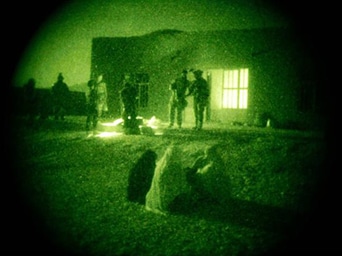
These days, when I watch state-run Afghan TV, which is funded by American money, I am surprised by how openly Afghan experts criticize US military tactics in Afghanistan. This is new.
By Hanan Habibzai
Kapisa district police chief Abdul Hamid Erkin told AFP: “Two nights ago foreign special forces carried out a raid on a house in Geyawa village in Nejrab district.” The next morning their plane carried out an airstrike on a house in the village as a result of which seven children and one adult were martyred.”
He said commanders of French troops who operate in the area “claimed that the target was a group of Taliban facilitators, but we checked the area and there were no Taliban.” In fact the people in the area have very strong anti-Taliban feelings. We filmed the victims, who were children, and showed it to the French commanders,” district police chief told AFP.
Presidential statement confirmed Thursday that NATO airstrike killed eight children in Kapisa province northeast of the capital Kabul. The children were aged between seven and 15, he said, while the adult was a mentally-handicapped 20-year-old. The tragic incident comes about two weeks after Four French soldiers were killed by a loyalist Afghan officer in the same province (Kapisa) last month, pressuring French mission in Afghanistan.
President Nicolas Sarkozy immediately announced that France will pull out its soldiers from Afghanistan by the end of 2013, a year before the international deadline for a pulling out of combat forces in 2014.
An article that I wrote almost two years ago on a similar case is still relevant, I’d like to share that again.
Promote peace talks, Afghan war is not a success
The attack on Kabul on January 17,2010 which took place only metres away from the Presidential Palace, was evidence that not only have the international community and the Afghan government failed to win the people’s hearts and minds, but also they have lost their trust. The military conflict has now reached even the heart of Kabul. It is hard to imagine anywhere safe in the whole country.
But at this time of intensification of conflict, a debate is taking place among Afghan parliamentarians questioning the presence of the US and NATO in Afghanistan.
This is the anti-Western sentiment that the Taliban have for long been whispering into the ears of ordinary Afghans in the villages and valleys of the restive regions. Those Afghans who saw their children die, those who watched their women and elders in pools of blood, are increasingly becoming susceptible to this type of rhetoric. Many are in the process of changing their minds about the international troops.
The military commanders say that they have now made “protecting civilians” their priority, but just last month, 10 children were killed during a night-time raid carried out by US-special forces in eastern Kunar Province. As long as these incidents keep happening public anger against the US presence in Afghanistan will continue to grow.
Military attacks carried out by foreigners and that result in the killing of civilians are an insult to Afghans’ traditions and beliefs. In many instances, when the local population accuse international forces of killing civilians, the troops deny it and often dismiss evidence provided by Afghans. Also commonly heard is that troops were targeting terrorists in a raid, even when the victims are school children, or mothers with young children.
Sadly these tradgedies overshadow the killing of civilians in suicide attacks by the Taliban – preventing the public mourning of the innocents who lose their lives in such attacks. It has given cover to Taliban attacks that result in civilian killings across the country. Ordinary Afghans are now only talking against US military behaviour and forget attacks by Taliban which have killed hundreds of civilians.
In 2003 and 2004, I was reporting for international media agencies on clashes between two notorious warlords in the north, Rashid Dostom and Atta Mohammad. At the time I regarded the American presence in Afghanistan as crucial for protecting the country from war criminals and for helping to bring stability to the country. But now, I have begun to lose hope. The international security forces are creating such a terrifying atmosphere that it is hard for people to sleep at night.
These days, when I watch state-run Afghan TV, which is funded by American money, I am surprised by how openly Afghan experts criticize US military tactics in Afghanistan. This is new. A recent discussion program featured an influential historian and supporter of President Karzai, Habibullah Rafi. Rafi was talking about civilian casualties and warning American troops to end their animosity towards Afghan people.
The other guest, parliamentarian Iqbal Safi, warned that if American troops continue to kill civilians, they will face the same fate as the Red Army, which left Afghanistan, defeated, and shamed.The MP’s anger was clearly visible. The tension between Afghans and Americans is just beginning to surface but both countries are yet to see the terrible consequences of the discrepancy.
Americans should stop their stubborn approach in Afghanistan and take a more diplomatic and talk oriented track. Afghan Taliban should be brought to the political process and should be recognised as a political entity in Afghanistan.
Traditionally, mosques are run and controlled by Mullahs and historically they have enormous impact on peoples’ opinion in Afghanistan. One of the most effective ways to achieve stability in Afghanistan is to win the support of Mullahs and of influential religious leaders. I recommend that the international community negotiates with Taliban. War alone will never produce a brighter future for Afghans; it can only result in the loss of more and more lives.
Only when the violence ebbs will the torch of democracy be lit. As long as the fear and instability spreads, as long as each family is mourning a loss, so the enmities will deepen between families and tribes, and between the US and Afghanistan. Negotiation is always going to be more productive than violence.
Some will say that the Taliban are too cruel, and that if they become a part of the government, they may not allow women to go to work or school. Others will say that before negotiations there needs to be political reform to remove the warlords who massacred thousands, and some of whom were backed by the United States. There will be questions, and concerns. But in spite of these, there can be no doubt that what Afghans want more than anything is for the violence and killing to stop.

Hanan Habibzai, an investigative journalist with more than ten years of experience in global journalism has covered the US invasion of Afghanistan, the fall of the Taliban regime, and post-Taliban developments, including the rise of militancy in the country.
MA in global journalism from Coventry University, Hanan writes on the conflict in Afghanistan and the regional politics, his work has been published by the BBC Afghan Stream, Pajhwok Afghan News, Reuter’s news agency, the Washington Post, Veterans Today, several local and the global media agencies, Including contribution in a journalism book Afghanistan War and the Media: Deadline and Frontline (2010), edited by R, Keeble & J, Mair, Hanan’s academic work is published around the world.
ATTENTION READERS
We See The World From All Sides and Want YOU To Be Fully InformedIn fact, intentional disinformation is a disgraceful scourge in media today. So to assuage any possible errant incorrect information posted herein, we strongly encourage you to seek corroboration from other non-VT sources before forming an educated opinion.
About VT - Policies & Disclosures - Comment Policy



